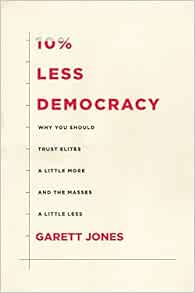Like many supporters of individual liberty, I’m an anti-majoritarian. I don’t want my freedom to be at the mercy of 51 percent of the population.  For all intents and purposes, I want the Supreme Court to protect the country from democracy.
For all intents and purposes, I want the Supreme Court to protect the country from democracy.
So, based solely on the title, I was automatically disposed to like 10% Less Democracy, a book authored by Professor Garett Jones of George Mason University.
But Garett’s book isn’t a manifesto about the American Constitution and its (sadly neglected) provisions designed to protect economic liberty. It doesn’t even mention my favorite part, Article 1, Section 8, which lists the few and limited powers of the central government.
Instead, his book focuses on a different topic. He’s arguing that we will get better outcomes if ordinary people have less influence on public policy.
 And he’s not subtle about that point. The full title of his book is 10% Less Democracy: Why you should trust elites a little more and the masses a little less.
And he’s not subtle about that point. The full title of his book is 10% Less Democracy: Why you should trust elites a little more and the masses a little less.
All of a sudden, I was less instinctively favorable to the book.
Simply stated, there are too many cases where the elite tends to be on the wrong side.
- They support the IMF.
- They oppose the Second Amendment.
- They favored TARP.
- They like value-added taxes.
When someone says we should trust the elite, I envision people like Mitt Romney and Michael Bloomberg deciding everything from how much tax we pay to what food we’re allowed to eat.
To be sure, people like that would produce a much better outcome when compared to having a lunatic like Bernie Sanders in charge of the government, but I’d like to have a government filled with people who are more likely to leave me alone, such as Calvin Coolidge, Grover Cleveland, and Ronald Reagan.
But you’re not supposed to judge a book by its cover. And that means you shouldn’t judge it by its subtitle, either.
So I took the bold step of actually reading the book (unlike, for instance, when I wrote about Nancy MacLean’s smear job against James Buchanan).
And I liked it. A lot. It’s well written, avoids needless jargon (you don’t need to be a trained economist to understand his points), and touches on many important issues.
And Garett does a great job of dispassionately providing evidence. So even when he made points that rubbed me the wrong way, I was forced to wonder whether I was thinking with my heart rather than my head.
Here’s a small sampling of why you should buy – and read – the book.
In Chapter 1, you’ll learn that there’s very little evidence that democracies produce better economic results, but you will learn that they’re less likely to produce famine and mass killings.
In Chapter 2, you’ll learn how Congress is a “favor factory” and read Garett’s hypothesis that politicians will be more likely to support good policies such as free trade if they have longer terms.
In Chapter 3, you’ll learn that independent central banks work better (yes, feel free to criticize the Federal Reserve, but nations such as Argentina show it’s always possible to get worse outcomes).
In Chapter 4, you’ll learn from state evidence that independent judges also generate better results, at least when compared to judges that are directly elected by voters.
In Chapter 5, you’ll learn that not all voters are created equal.
In Chapter 6, you’ll learn that public policy might improve if bondholders had a bigger say in government policy, an insight from Alexander Hamilton.
In Chapter 7, you’ll learn some “public choice” insights about getting things done in Washington (whether that’s a good idea is an entirely different discussion).
In Chapter 8, you’ll learn that joining the anti-democratic European Union is the right choice for some nations, but also that the United Kingdom had good reasons for Brexit.
In Chapter 9, you’ll learn how Singapore is a huge success story with “50% less democracy.”
Garett concludes with some analysis on how to get the right amount of democracy.
His basic hypothesis is that we have too much input from the masses and he even put together his own version of the Laffer Curve to show that we would get better outcomes with less democracy.
By the way, I can’t resist pointing out that you want to be at the peak of Garett’s Laffer Curve.
With the original Laffer Curve, however, that’s not the right outcome.
P.S. Garett’s book does suffer from one sin of omission. I would have appreciated a chapter on the anomaly of Switzerland. It’s a very successful, very well-governed nation, yet it has an extremely high level of not just democracy, but direct democracy. Voters directly decide all sorts of major policy issues.
Is Switzerland an exception to the rule? Are Swiss people simply more rational than their neighbors? Does the country’s federalism-based model lead to better choices? It would be fascinating to get Garett’s insights.




